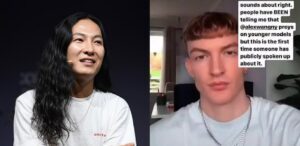
Should accountability be universal? What happens when someone is accused of sexual assault? They, whoever it is, must suffer the consequences, at least that’s what majority beliefs. In recent years sexual assault allegations against Alexander Wang have surfaced. Alexander Wang is a Taiwanese American fashion designer who launched his brand in 2005 at the age of 21. In 2008 Wang was awarded the Council of Fashion Designers of America (CFDA)/ Vogue Fashion Fund. “CFDS and Vogue believe in the young American designer community and want to continue to nurture, support, and empower it.” This is found at the very homepage cfda.com. From 2012-2015 Wang was the creative director at Balenciaga. Without a doubt Wang created a name for himself and is a well known designer around the world. Through his work and personal life he created a party aesthetic for himself.
Things took a turn when allegations surfaced regarding sexual assault against Alexander Wang. Many individuals took to social media to expose their experiences with Alexander Wang, featured on BBC news on February 24, 2021 many victims described with detail their encounters with Wang. Majority of the victims featured in this article were between the ages of 20-25. Lisa Bloom is a high-profile lawyer who at the time was representing a total of eleven men with sexual misconduct allegations. Wang originally denied all the claims that were made against him, stating that he had never met them. After Owen Mooney uploaded on TikTok claiming Wang groped him during a concert, Wang claimed that those allegations were “baseless and grotesquely false” and further stated he would “hold accountable” the people that were spreading those false claims. Victims suggest that most incidents took place at LGBT clubs.
The #MeToo movement was founded by activist Tarana Burke in 2006, but gained most attention in 2017 when Alyssa Milano encouraged sexual assault victims to use the hashtag to tell their stories. This allowed for victims of Alexander Wang to speak their truth via social media. Through the internet, as viewers we have this notion that we need to hold people accountable ourselves. This relates to cancel culture and the need to remove people for deviating. Especially with celebrities and influencers, I think we hold them to a higher standard and expectations because of how many people their actions reach. Unfortunately, no matter how much we condemn individuals for things such as sexual assault, we cannot do much then just “cancel” them for a while. Of course the law can hold them accountable!
This is something that upsets our communities. We are supposed to believe defendants are innocent until proven guilty, but we also want to validate the victims that speak up about their experiences. So how could we balance this?
Alexander Wang initially claimed that all the allegations were false and he had never met the victims. However, he later met with the individuals in 2021 and took to instagram to say, “A number of individuals have come forward recently to raise claims against me regarding my past personal behaviour, I support their right to come forward, and I’ve listened carefully to what they had to say. It was not easy for them to share their stories, and I regret acting in a way that caused them pain.” He also added “(they) disagree on some details of these personal interactions.” Since then he had kept a low profile from the public. That changed when he made his first appearance in April 2022 with a Los Angeles runway show.
Julia Fox, a very well-known actress and model, closed the show for Wang and received lots of backlash. She went on TikTok and said “We do need to leave room for rehabilitation and for those who put in the work and heal and learn from their mistakes” The question was now about what Wang had been doing to learn, grow, and redeem from his mistakes?
It is clear that sexual misconduct is highly denounced by our society, it is questionable whether artists, celebrities, influencers, etc. actually suffer the consequences. Sure cancel culture is a whole different argument and controversy on its own, but how much are these perpetrators actually learning and being held accountable if they are returning to the public like nothing happened? Alexander Wang acknowledged the damage that he had caused, but continued to grow his brand abroad, in China. He returned to the fashion industry putting on runway shows, including individuals that are influential in the industry. Many were upset that he was able to return with almost no acknowledgement to the past accusations, and he continued to build his brand and enjoy success. Should Wang, and other perpetrators, be able to continue enjoying success in the public although they have “rehabilitated”? What standards should we hold before reentering the public scene? Or should they return at all?
